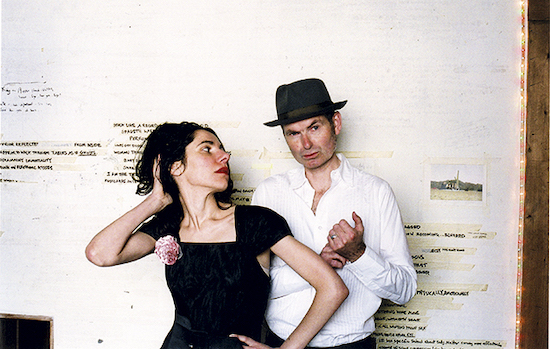John Parish is a prolific musician, producer, performer and soundtrack composer with over 100 credits on production, writing, arrangement or performance to his name. If you haven’t knowingly heard him, you’ve probably caught something he’s worked on – from albums by Jenny Hval, Sparklehorse, and Tracy Chapman, to Rokia Traore, Eels’ Souljacker, Goldfrapp, and Howe Gelb, among others. He is probably best known for his long-time collaboration with PJ Harvey, the subject of this Baker’s Dozen.
Parish grew up in Yeovil and started out in the 1980s playing drums and guitar in various new wave and punk bands, before learning production and then later teaching it. He rarely tours nowadays, and stopped doing so when he had a family. He is hard working, humbly so, and once said (in an interview for TapeOp) that he only functioned with good ideas in the studio for “maybe ten hours” at a time, as if that made him a lightweight. When we spoke, he told me about how he was struggling to stop fiddling about and get down to serious work on his own next solo album, before revealing that he started it less than a year ago – still fresh by many people’s standards.
Parish lives and works in Bristol, where the bulk of his work is in the studio. When we speak, he’s recently finished recording the fourth Aldous Harding album, and the debut by London band Dry Cleaning. Most of his work now is with, for, or alongside other people, and he says he discovered, to his surprise, that he loved collaborative work, after spending his early years wanting to play everything and be in control of every part: “I was pretty dictatorial in some of my early bands,” he says, “so the later willingness to embrace collaboration was almost a reaction against myself. I found it interesting working with people who were coming from very different places. That would then feed into my work, and I realised how quickly I improved as a writer, musician, and creative thinker, just by being involved with other people. It became apparent to me that that I really responded to that. I think other people liked working with me too, because they felt I was good at understanding what they wanted… production really is 95% about trust.”
Parish’s longest and best-known collaboration has been with PJ Harvey, who he met in 1988 when Harvey was still a teenager and joined one of Parish’s early bands, Automatic Dlamini. He worked on To Bring You My Love, White Chalk, Let England Shake and The Hope Six Demolition Project, and played in her touring band on and off from 1994 to 2017. They have released a number of collaborative albums, including A Woman A Man Walked By and the recently reissued Dance Hall At Louse Point. For these, Parish usually records the music, to which Harvey responds, adding lyrics and voice. “I’m always invested in her music because we’ve been great friends for all of our adult lives,” he explains, “so I’m a very harsh critic of her work because I know she’s capable of great things. We’re able to be blunt with each other, because we love each other’s work, but that doesn’t mean we’re going to love everything we do because we’re different people. You need a small pool of people you can rely on, and whose taste you can understand.”
Here he chooses his favourite of her recordings, from what he stakes out as her first great song, to visionary moments from their long and influential careers.
PJ Harvey’s reissue series is ongoing, with Stories From The City, Stories From The Sea and attendant demos record up next. To purchase, follow the Norman Records links at the foot of the article. Click the image of the duo below to begin reading Parish’s thoughts on Harvey’s music



